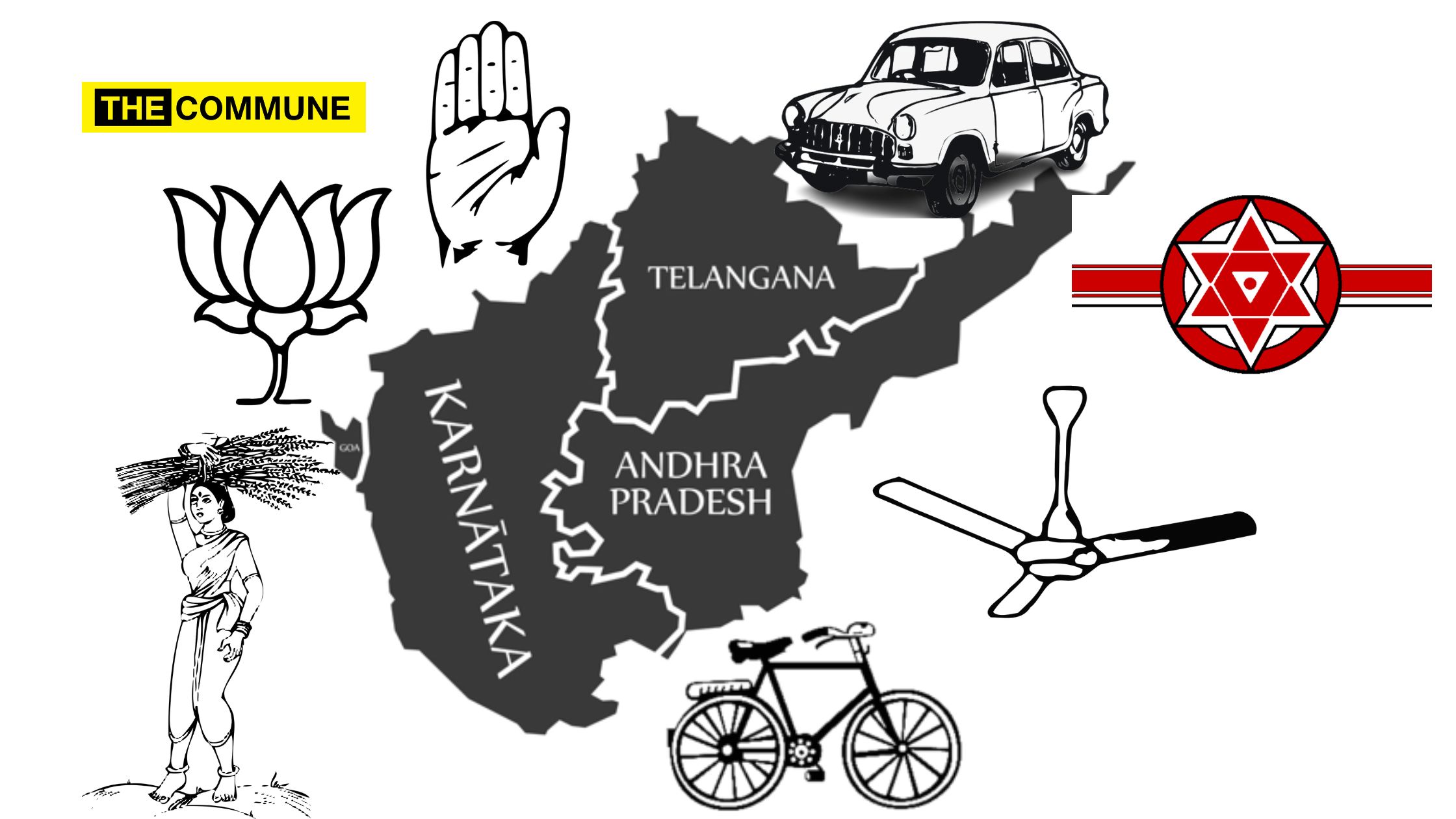
December has been a month of hectic political maneuvering, propositioning and alliance-building in the three South Indian states of Karnataka, Telangana (upcoming state elections in 2023) and Andhra Pradesh (polling scheduled for early 2024).
The world of politics by its very nature, is one of opportunism where hawkish eyes are always on the lookout for wounded egos, just-in-time partnerships and strategic need-based allegiances. Many of the on and off political partnerships across the Indian political landscape and a large number of fair-weather political friendships of the opportunistic variety, have ceased to surprise us.
An element of mild surprise is back in the news with the recent declaration of partnership between two political outfits across state borders in South India. Karnataka’s Janata Dal Secular (JDS) and Telangana’s Bharath Rashtra Samiti (BRS, formally TRS) are said to be forging a cross-border partnership ahead of Karnataka state elections, scheduled to be held before May 2023 and Telangana stste elections scheduled to be held before December 2023. JDS leader, Kumaraswamy and BRS leader, K Chandrasekhar Rao have made public announcements of a political agreement between the two parties.
Next summer’s state elections are crucial to the relevance of Karnataka’s JDS party, a regional party, fighting to win against the ruling BJP party and the opposirion Congress party, both of which are larger national parties.
The challenges experienced by regional parties are different to those faced by national parties in terms of manpower, financial resources, technology, access to national level subject-matter-experts (sme’s) and clout with elected leaders, across the nation. Telangana’s BRS party aspiring to grow into a national party, is at present still a regional one, facing similar challenges as the JDS.
What’s Cooking In Karnataka?
Karnataka has a number of districts on its border with Andhra and Telangana, with significant numbers of Telugu speaking people, whose votes carry enough weight to make a difference between winning and losing in the border districts. In the past, the JDS has been known to seek help from the Andhra-Telangana based Telugu Desam Party (TDP), with which it has historically had good ties. In fact, it was widely believed that JDS founder, H.D Deve Gowda became India’s 11th Prime Minister, with the support of the TDP founder, Telugu actor and politician N.T Rama Rao. Deve Gowda’s tenure as Prime Minister of the country (1 June 1996 to 21 April 1997) lasted less than one year but understandly brought him honour in his home state and helped him float his own political party, shortly after.
The Janata Dal Secular (JDS) was formed in July 1999 as a breakaway faction of the Janata Dal party. It is led by former prime minister, H D Deve Gowda and his family. It has a political presence mainly in Karnataka and is registered as a state party in two other states, Kerala and Arunachal Pradesh. The JDS has had a less than an ideal record with its coalition politics. It was a partner in the Karnataka coalition government of 2004, first with the Congress and later with the BJP, both of which witnessed distrust and lack of cooperation leading to an eventual collapse of both partnerships. It went into a coalition arrangement again with the Congress party in 2018 but lasted less than two years in governance. Will it do better with an alliance of a non-Karnataka party? It would be interesting to see if Telangana’s BRS party will truly be able to make a diffrrence in the electoral hopes of Karnataka’s JDS party in the upcoming 2023 state polls. Both the BJP and the Congress have personnel-related issues within their respective parties, that are best resolved well before the mid 2023 elections. The JDS is looking to cash in on unhappy “rebel” leaders of both parties.
The seven districts in Karnataka with a significant Telugu speaking population are Bidar, Yadgir, Raichur, Vijayanagar, Ballari, Kalburgi and Koppal which cover 41 Assembly constituencies. These areas were a part of the erstwhile Hyderabad State till 1948. The residents of these districts speak Telugu as well as some Urdu and Hindi.
It is these districts that the JDS hopes to swing the Telugu vote in its favour, with the help of the BRS party. Sources state that the BRS party has shown interest in fielding candidates for the 41 assembly constituencies, spread over the seven border districts with the Telugu speaking population. The JDS-BRS tie up in Karnataka’s Telugu border districts, hopes to win over the large farmer base there, by highlighting agricultural schemes put in place by the BRS party in Telangana.
The Undercurrents In Telangana
In the mean while, on its home turf, Telangana’s ruling BRS party is getting ready to take on heavy competition from the state’s BJP, which has gotten stronger since the last state elections. It is also closely watching two other recent developments of significance – 1) The much rumored in-fighting of the Telangana Congress party, which finally went public with twelve of its members quitting the party recently, 2) Even before the high drama within the ailing Congress party had the chance to subside, the state unit of the Telugu Desam Party (TDP) announced its plans for a “massive” revival in Telangana.
The Telangana state’s Congress unit has been expressing dissent for a while now. The clash of egos and disagreements is between the two main factions within the party – the old guard/ Congress veterans and the newer members of the party consisting of the state’s ex-TDP members (most of the members had defected to the Congress or the BRS, when the TDP’s focus shifted to Andhra Pradesh after the united Andhra state’s bifurcation in 2014). The current president of the state’s party is Revanth Reddy, who is of the latter category, a popular ex-TDP leader who, in the TDP’s hey day, was reputed to have had a good rapport with the TDP leader, Chandrababu Naidu.
Sensing the vulnerabilities of the state’s Congress party, a struggling BRS party fighting anti-incumbancy and a fast growing BJP presence in Telangana, the TDP recently held a show of strength at a well attended rally in Telangana’s Khammam district, where party leader Chandrababu Naidu, announced a revival of his party which had previously enjoyed a solid presence in the state. A fourth party, new to the state and still trying to take off, is the YSRTP party headed by YS Sharmila, who is the sister of the current Andhra Chief Minister, YS Jagan Mohan Reddy.
Amid the still unfolding tapestry of a uncertain political landscape, parties continue to trade alliances even as party members continue to swap parties! The plot thickens in Karnataka, Telangana and Andhra Pradesh with leaders desperately wanting to keep their political fortunes intact in the next state elections.
Andhra Parties Pulling Up The Sock
In neighboring Andhra Pradesh which shares borders with Telangana, Karnataka and Tamil Nadu, the political heat is just as intense and palpable with a heated war of words as well as actions, among the major contenders- the incumbent YSRCP party led by Jagan Reddy, the TDP party led by Chandrababu Naidu, the JSP party led by Pawan Kalyan and the state’s BJP party struggling to make inroads in Andhra, despite a past alliance with the previous TDP regime and a current informal understanding of sorts with the incumbent YSRCP dispensation.
Andhra’s state elections are scheduled to be held in the first half of 2024. It is widely rumored that the BJP wants to try testing the waters with the JSP party but is playing it cautiously as the larger, older, more experienced TDP party is said to be on good terms with the relatively new JSP. The TDP and JSP together make a strong opposition to counter the YSRCP, hence it’s important for the BJP to make a well calculated move for the state’s 2024 elections.
In yet another twist to the classic “Tale of Two States” saga, underscoring an affirmation of the inter-dependencies and connections between the two Telugu states, the TDP’s posturing in trying to revive its fortunes in Telangana, speaks of possibly enticing the BJP in lending it covert support in both Andhra and Telangana, for the current benefit and future growth of both parties, as a unified anti-Congress opposition in both states. With the TDP and JSP not being averse to each other, both vowing to fight the YSRCP and both parties warming up to the BJP, where does the AP state BJP unit see itself, considering that it is also not on bad terms with the YSRCP?
It’s an ironic case of too much choice for the BJP in Andhra. Its Telangana scenario is simpler – the BJP will most likely fight the state elections on its own with the possibility of teaming up with a second party, post the elections…based on electoral results. As for the Congress party, it seems to have lost its core base in both Andhra and Telangana. 2023 promises to be an electrifying, game changing year in all three of these states going to the polls within the next 12-18 months.
Click here to subscribe to The Commune on Telegram and get the best stories of the day delivered to you personally.




